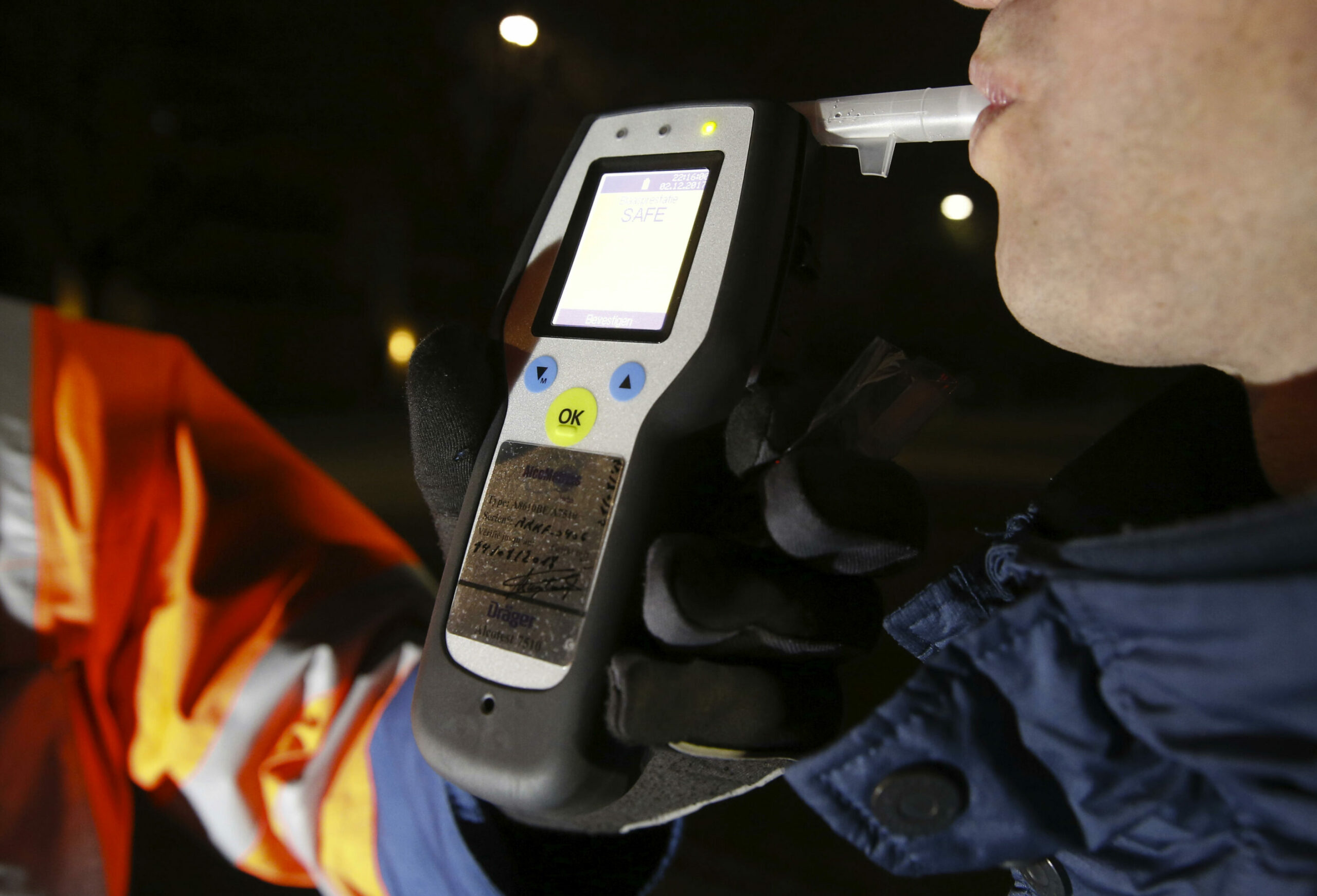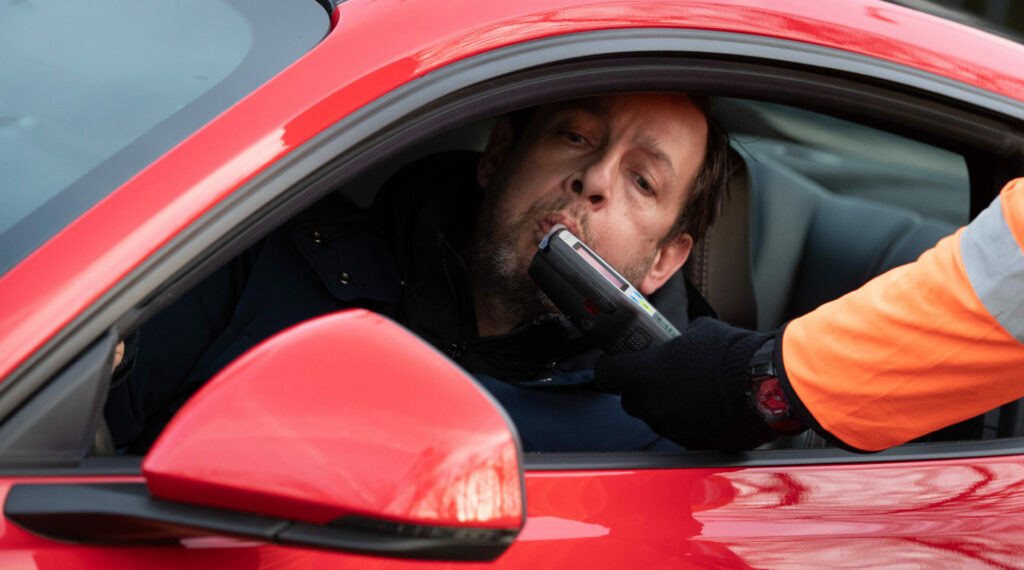Driving under the influence of alcohol remains a major hazard to road safety, and Belgium is shifting up a gear in efforts to tackle the offence. But what are the current limits, and what punishments do drivers face if apprehended under the influence?
Blood alcohol limits and fines differ across Europe and change at the national level. While many countries, mainly in the east of the continent, have zero-tolerance policies, the rules in Belgium remain less strict than safety experts would like.
Drink driving is still quite common in Belgian and is one of the three main killers on the road. Last year, it led to more than 3,900 accidents involving injuries. At least 115 lives could be saved every year if no motorists got behind the wheel after drinking, figures have shown.
The average blood alcohol level of drivers causing such accidents is 1.7 promille (‰), which for an average male is the equivalent of more than ten drinks within three hours.
What happens during a police check?
Road alcohol checks have been stepped up hugely in recent years, with police regularly organising "BOB" campaigns to encourage people to designate a driver when going out.
Breath tests are conducted by police officers in routine road checks. In some cases, "alcosensors" or "sniffer" devices analyse the air in the car. If the machine sounds the alarm, the driver is subjected to an alcohol breath test. Previously, people had the right to ask for a 15-minute postponement, but this measure was dropped as breathalysers have become more reliable.

A person who tested "safe" in the breath test. Credit: Belga/ Nicolas Maeterlinck
The breath test gives the first indication of whether a person has been drinking. It provides three readings: S (safe), A (alarm) or P (positive). With an S, the person can continue driving. An A or P will require the driver to undergo a breath analysis to ascertain their exact alcohol concentration.
Drivers have the right to ask for a second analysis, and if the results of this differ significantly, a third analysis can be carried out. The most favourable result will be retained. Above a certain limit, a counter-analysis using a blood test can also be requested.
People who refuse the tests will lose their driving licence for 15 days and in most cases be summoned to the police court.
Limits, fines and driving licence withdrawals
Individuals driving a vehicle on a "leisurely" basis are punishable once the breath analysis shows 0.5 ‰ in the blood or 0.22 mg per litre (mg/l) of exhaled air. Professional drivers face a fine once they go above 0.2 ‰, which in practice amounts to a zero-tolerance policy.
Police can issue on-the-spot fines and temporarily remove driving licences. Failure to pay a fine can lead the public prosecutor to propose an out-of-court settlement and in some cases the temporary withdrawal of a driving licence. If this penalty is also not paid, the offender can be summoned to court and face a heftier fine.
These are the various punishments per measured alcohol level:
- ≥ 0.2‰ - < 0.5‰ (professionals):
- Police: €105 and two hours withholding of licence
- Public Prosecutor: €115
- Court: €200 to €4,000
- ≥ 0.5‰ - < 0.8‰:
- Police: €179 and three hours withholding of licence
- Public Prosecutor: €189
- Court: €200 to €4,000
- ≥ 0.8‰ - < 1.0‰:
- Police: €420 and six hours withholding of licence
- Public Prosecutor: €430 and possible withdrawal of driving licence
- Court: €1,600 to €16,000
- ≥ 1.0‰ - < 1.15‰:
- Police: €578 and six hours withholding of licence
- Public Prosecutor: €588 and possible withdrawal of driving licence
- Court: €1,600 to €16,000
- ≥ 1.15‰ - < 1.5‰:
- Police: Immediate withdrawal of driving licence for 15 days (since June 2023)
- Court: €1,600 to €16,000 and possible driving ban (eight days to five years)
- ≥ 1.5‰:
- Police: Immediate withdrawal of driving licence for 15 days
- Court: €1,600 to €16,000 and possible driving ban (eight days to five years)
In the event of an accident, offenders face a driving ban of at least three months (or six in the case of a fatality), mandatory driving tests and the possible imposition of an alcohol lock.
A judge is obliged to impose an alcohol lock (accompanied by a programme) on drivers caught with 1.8‰ of alcohol in their blood (unless there is good motivation not to do so), or on people who are caught with 1.2‰ or more of alcohol twice in three years (it is not possible to deviate in this case). The fines also rise sharply on a subsequent conviction.
Related News
- Mandatory 'mutualité': Figuring out health insurance in Belgium
- Filing taxes in Belgium: How does it work?
From 1 January 2025, foreign drivers caught under the influence of alcohol or drugs on Belgian roads will be required to pay a minimum on-the-spot fine of €1,260. Drivers who cannot or refuse to pay will have their vehicles impounded for 96 hours by the police.
Stef Willems, a spokesperson for Vias Traffic Safety Institute, stressed that higher fines alone won't put an end to driving under the influence. "Bigger fines won't punish people with no money. Authorities must look at the whole chain from raising awareness to catching people and punishment."
Vias has proposed a zero-tolerance approach, which Willems argued makes it easier to hold people accountable. It also suggests a ban on apps or social media pages that inform people of the location of police checks in real-time so they can avoid them. "This helps increase the chances of people getting caught."

